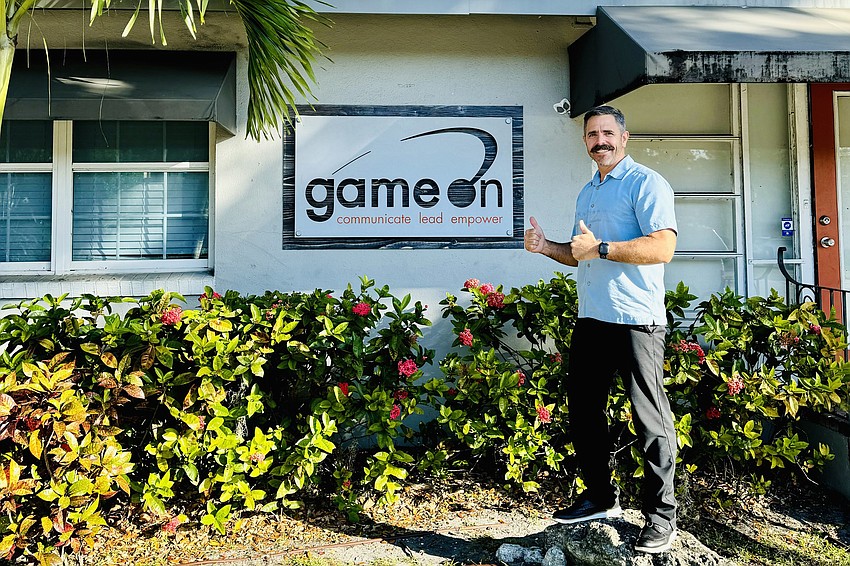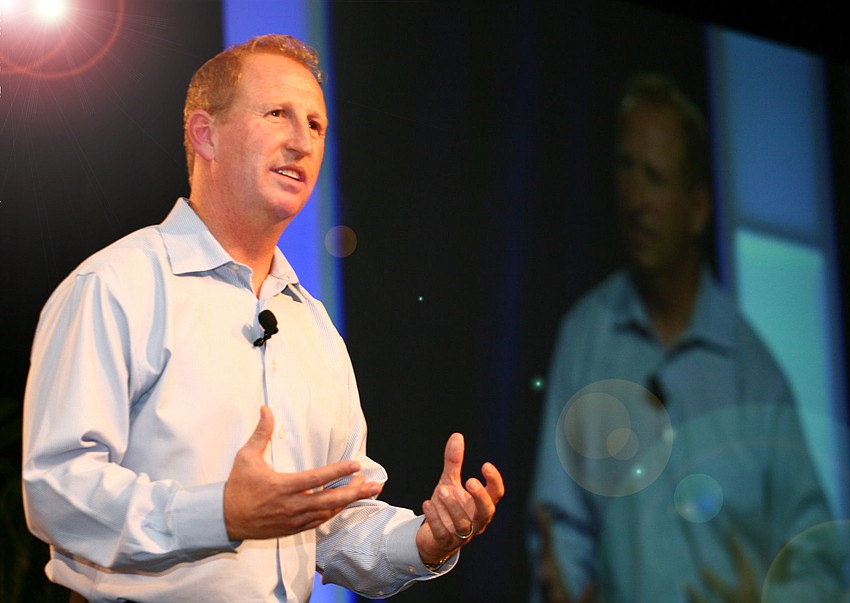- December 25, 2024
-
-
Loading

Loading
Benjamin “Jake” Higginbotham, armed with a highly decorated career in the U.S. Air Force, including Special Operations leadership roles in Iraq, Kosovo and Afghanistan, had his pick of places to work at when he retired from the military.
Born in Texas, Higginbotham’s last post was in Pearl Harbor, where he was the senior enlisted leader in a cybersecurity unit. He and his wife fell in love with Hawaii. But the couple has since moved quite a distance, to the west coast of Florida, for Higginbotham’s next career chapter — where he will be a civilian for the first time in nearly 30 years. Higginbotham is now COO of Game On Nation, a Bradenton-based leadership development and team-building company with clients from Lakewood Ranch to Los Angeles.
“I had lots of other opportunities, but I wasn’t passionate about them,” Higginbotham says, referencing potential consulting gigs outside Washington, D.C. in cybersecurity and tech. “I’d been in every kind of military training there is, but when I saw Game On, I knew this was different. And I really wanted to work for a small business. I love the human condition. I love the challenges that come with leading, inspiring and building teams. I love building better teams.”

Higginbotham joined the company in June, first as an intern through a U.S. Department of Defense program. And his ascension to COO, announced in November, comes at a time that could be dubbed Game On 3.0.
The first iteration of Game On dates back to 1997, when Shenbaum, an actor in Hollywood in his first career, founded the business. He moved to Bradenton in 2003, and the company was housed at IMG Academy, where it worked with young athletes. Game On 2.0 came in 2012, when Shenbaum and colleague Blair Bloomston moved out of IMG to target clients outside sports, working with large companies, executives, nonprofits, military agencies and more.

Bloomston left Game On in November to launch her own agency. That partially led to Game On 3.0, where the company now looks to add more organizations in the local area to its client list. The company has four full-time employees, with Erin Watson and Chris Friday part of the team that includes Shenbaum and Higginbotham. It also has nine freelance presenters and consultants.
Shenbaum, 53, and Higginbotham, 50, who met through a mutual friend, have a shared interest in making people around them, from clients to colleagues, better people. That was evident from a lunch conversation and later in a podcast interview with Shenbaum.
On the surface, it’s an unusual match: Higginbotham the retired special ops military leader who runs ultra-marathons and Shenbaum the reformed actor who calls himself a recovering narcissist. But that duo, individually, has also learned some interesting leadership insights. Highlights include:
Down to earth: Higginbotham worked under two noted military leaders at various times in Special Operations: Gen. Stanley McChrystal, commander of the U.S and NATO forces in Afghanistan, and Admiral William McRaven, commander of U.S. Special Operations Command. McChrystal stood out for his relatability — regardless of rank. That was a big lesson for Higginbotham. “He really took the time to get to know his people at whatever level they were at,” Higginbotham says. “He would sit down at the table with you and get to know you. He went around the room and knew each person‘s name and their families’ names.”
Humble pie: Another important leadership lesson Higginbotham learned in the military? Humility. One example of seeing that in action came in 2017 when he was part of a joint task force in the Horn of Africa, in Djibouti, under the command of a gruff, three-star U.S. Marine General. While he didn’t have the national notoriety of a McChrystal or McRaven, this superior, says Higginbotham, “was very intimidating.” That made it even better, he adds, when that general admitted a mistake. “He had the presence to say ‘you’re right, let's change direction,’” Higginbotham says. “He had the humility to say I was wrong.”
Get back up: Game On’s beginnings stem from something nearly anyone who has been, or aims to be, successful in business has experienced: rejection. Shenbaum grew up in West Covina, California, outside Los Angeles, and studied theater at Northwestern. He moved back to L.A. after college and got into acting. He found some success. But he found a lot more rejection. “I was passionate about performing,” he says. “But I was not excited about the industry of Hollywood. It's very difficult. No human is geared to go through that level of rejection. No one can be like, ‘Dude, I can't wait to wake up and get rejected. I hope it's done a lot today.’”
Game, set match: That led to an epiphany moment. “What really intrigued me,” Shenbaum says, “was improvisation and the power of laughter.” Shenbaum started helping others, friends at first, get better at auditions, he said on the podcast. “And then athletes started to join me and then Pete Sampras became part of my ecosystem. He was the No.1 tennis player in the world at that time. And Pete was represented by IMG, and that's the connection to IMG Academy in Bradenton. So I started to fall in love more with teaching, and watching people grow and seeing light bulbs go off for their communication and their media training.”
Sell point: Shenbaum says understanding his strengths and weaknesses, and where he fit in the industry, was not only essential to overcoming rejection, but it was also integral to succeeding in business. He shares that ideal now with clients, that, whether it’s an established business or a startup, it’s important to know “what your gifts are” and “what makes you attractive.”
“I always knew going into the room, I wasn't going to be seen as the red Ferrari, I was maybe more of a, no offense, blue Volvo. No offense to blue, no offense to Volvo. No offense to me, but that was more of my rhythm. And that helped me sort of like, be authentic, which is a very, very popular word in this industry now.”
Pay attention: Game On has become well known, among clients and in presentations, for its catchphrases. "Laugh with, not at" is a big one. "Add value" is another. On the podcast, Shenbaum stresses that the phrases, more than being pithy or witty, are designed to be things you can build into your routine to make you a better leader, better person. Like "Celebrate small wins." “Don't just go for (the) epic victory,” he says.
Loosely connected to celebrating small wins is celebrating staff members. Shenbaum says it’s not exciting or “sparkly,” but one habit-forming way to do that, another catchphrase, is laptop down. “The crowd will never go wild because laptop down is not viral,” he says, but it’s meaningful to the employee who just walked into your office.